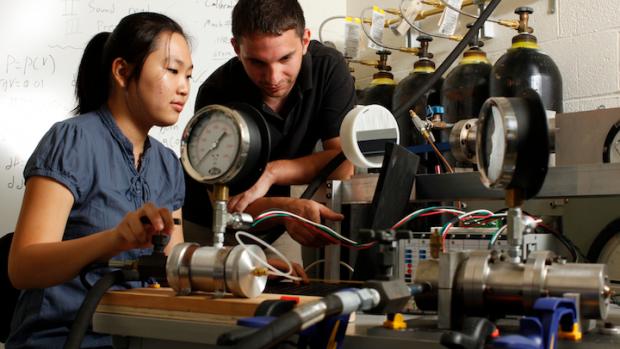The Future Of Engineering Education: Students From NYU Abu Dhabi Visit NYU-Poly

"The professors are just amazing," says Songyishu Yang, who took part in the 5th annual Undergraduate Summer Research Program at the Polytechnic Institute of NYU this summer.
As spring drew to a close in the United Arab Emirates, Supatra Lee and Songyishu Yang, both rising sophomores at NYU Abu Dhabi about to attend the 10-week program in Brooklyn, were curious to see how Poly's 2008 merger with NYU would impact the engineering and technology school. "After coming here and meeting the professors and also the graduate students, I feel like NYU-Poly is a really good school," smiles Lee. Yang nods in agreement.
Together with Lan Duong, the three represent the contingent selected from NYU Abu Dhabi for the Undergraduate Summer Research Program, which brings students from different schools of NYU to NYU-Poly, where, supervised by participating professors, they embark on research projects that complement the faculty member's own work. Some projects place students in labs that include high school and graduate students, while others work directly with a single professor.
A Growing Relationship
This is the first year that NYU Abu Dhabi, which opened last September, has been invited to join the program, and Sunil Kumar, dean of the engineering program there, believes the relationship is important for the larger body of NYU.
"One of the things we're trying to do is create a university that has a seamless circle of students, ideas, faculty and so on, and to have greater connectivity between Abu Dhabi and here, which is really the home campus for engineering," Kumar says.
The tie between both campuses is especially significant because each represents a different educational model for engineering. Founded in 1854, NYU-Poly features a more traditional curriculum, while NYU Abu Dhabi offers a more integrated approach, one that heavily incorporates the liberal arts.
That approach represents "the future of engineering," contends Professor Harold Sjursen, who teaches in NYU-Poly's Department of Technology, Culture and Society. "A traditional engineering school is very narrow," he explains. "A civil engineer has one curriculum, a mechanical engineer has another, but as science and technology advance, these kinds of distinctions between traditional engineering disciplines are becoming anachronistic."
Looking to a Global Future
Added to the pedagogical shift is a geographic one. "The future of engineering is more global with more collaboration," says Iraj Kalkhoran, associate provost of undergraduate academics. "The U.S. is no longer the dominant figure in these fields. There's a lot we can learn from interacting with different parts of the world."
Of course, NYU-Poly's more traditional curriculum still has much to impart, says Kumar. The engineering program is smaller at Abu Dhabi, he explains, and the students traveling from that campus to New York "get to understand the complexities, as well as the opportunities, of engineering in a much more comprehensive setting."
"In Abu Dhabi, you don't have this kind of atmosphere of being surrounded by engineers," says Yang. "It's been a wonderful, wonderful experience."




